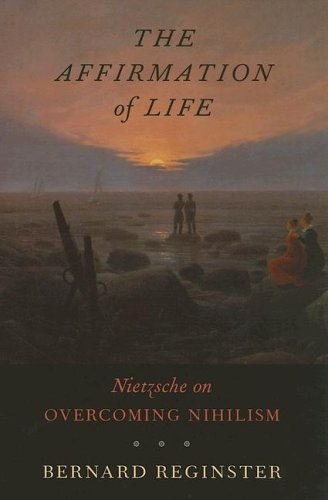
Among all the great thinkers of the past two hundred years, Nietzsche continues to occupy a special place–not only for a broad range of academics but also for members of a wider public, who find some of their most pressing existential concerns addressed in his works. Central among these concerns is the question of the meaning of a life characterized by inescapable suffering, at a time when the traditional responses inspired by Christianity are increasingly losing their credibility. While most recent studies of Nietzsche’s works have lost sight of this fundamental issue, Bernard Reginster’s book The Affirmation of Life brings it sharply into focus.
Reginster identifies overcoming nihilism as a central objective of Nietzsche’s philosophical project, and shows how this concern systematically animates all of his main ideas. In particular, Reginster’s work develops an original and elegant interpretation of the will to power, which convincingly explains how Nietzsche uses this doctrine to mount a critique of the dominant Christian values, to overcome the nihilistic despair they produce, and to determine the conditions of a new affirmation of life. Thus, Reginster attributes to Nietzsche a compelling substantive ethical outlook based on the notions of challenge and creativity–an outlook that involves a radical reevaluation of the role and significance of suffering in human existence.
Replete with deeply original insights on many familiar–and frequently misunderstood–Nietzschean concepts, Reginster’s book will be essential to anyone approaching this towering figure of Western intellectual history.

Very well done. This book has its minor faults, such as the propensity to get long winded and/or redundant at times, however as a whole it is a fabulous contribution to the wide berth of secondary lit on this giant. Reginster’s systematic approach is controversial in of itself, but his arguments are well developed and do have a good deal of support. He addresses alternate interpretations of Nietzsche’s thought, and discusses these other views in some depth. In all, the book concludes with a coherent and…
From a Lay-Reader’s Perspective… “The Affirmation of Life” is a systematic analysis of the complex relationships among nihilism and Nietzsche’s concepts of the will to power, the revaluation of values, and the eternal recurrence. The argument (very basically) is that in order to overcome the disillusionment and despair that comes from living in a Godless world — a world devoid of transcendent, objective values — individuals need to create within themselves a code of life-affirming values that will empower them to embrace,…
An Assignment Among the Herculean Labors This was an extremely dense (and intense) book, but that really was not the greatest annoyance I found. The first half is liberally sprinkled with unnecessary redundancies–less dedicated readers may find themselves thoroughly frustrated with such a thing; yet in spite of this, my interest remained strong: for although certainly not a novel, I awaited the tying-up of loose ends and for Reginster to expound upon his theory with finality. Such was the case in the second half of the work, which…